
1914: Communal Hatred in a Gentlemen’s Club
We are in a gentlemen’s club. A member has temporarily forgotten the war and asks for a lager, as he has no doubt done on countless occasions in the past. The other members are seething with anger and some look as though they are going to attack the culprit.
I am sceptical about this. The object of the picture seems to be to show that toffs could be just as demented about anything German as their less well-off fellow countrymen. These men are not like the mobs that broke the windows of people with German names. I doubt that they would ever read the Daily Mail. In reality someone might offer a quiet word of advice on the subject. It is much further down the social order where you would encounter such blind hatred particularly so early in the war.
It also occurs to me that many a wealthy household would find itself left with many bottles of fine (and expensive) German wines laid down in the past. I doubt that people would have poured the contents down the drain. It is much more likely that they would prudently drink the contents either when there no visitors were present or when among people that they knew really well.
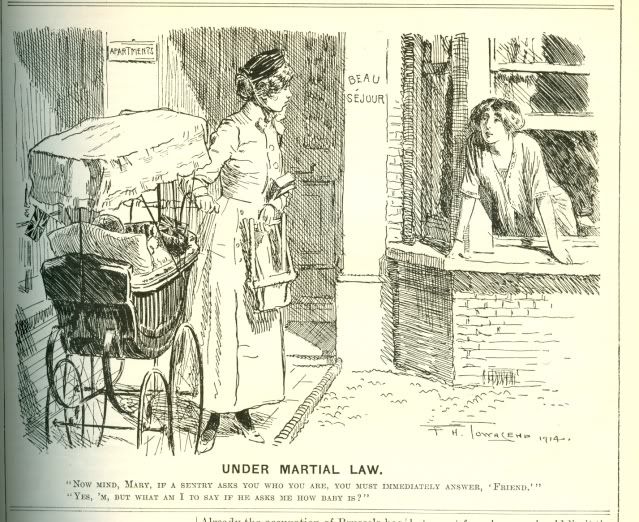
1914: Confronting a Military Sentry
The baby’s mother warns Mary what to say if she is challenged by a sentry so that she won’t be detained. It looks as though Mary has already introduced herself to him. She has every intention of being ‘detained’ by him again. She already knows that he is going to start off by asking how baby is. The war would give rise to many opportunities like this.
We note the detail of Mary’s preparation for her walk. The pram is clearly ‘state of the art’ and now sports an important new accessory - namely a patriotic Union Jack.
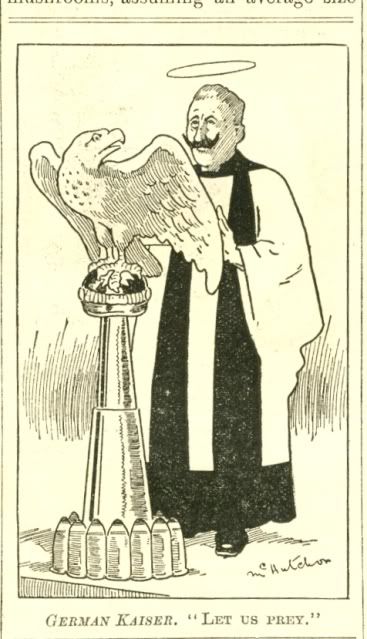
1914: The Kaiser as a Principal Hate Figure
This is the first time (but by no means the last) that a Punch cartoon identifies the Kaiser as the principal hate figure. It had not always been so. This is how he was portrayed in the same magazine in 1900:

This cartoon would have been embarrassing to remember in 1914. What had prompted this grovelling approach? It had appeared during the last year of Queen Victoria’s reign. At that time people were mainly conscious of him as the Queen’s oldest grandchild. As such, he was considered to be a member of the extended British Royal Family. However, after the death of his grandmother, he started building up Germany’s military might. For example, with the industrial power of the Ruhr at his disposal, he began building battleships at a rate which alarmed Britain. This led to an arms race which by 1914 was already causing apprehension in Britain.
It was said of him the he admired the British Empire so much that he wanted one of his own.
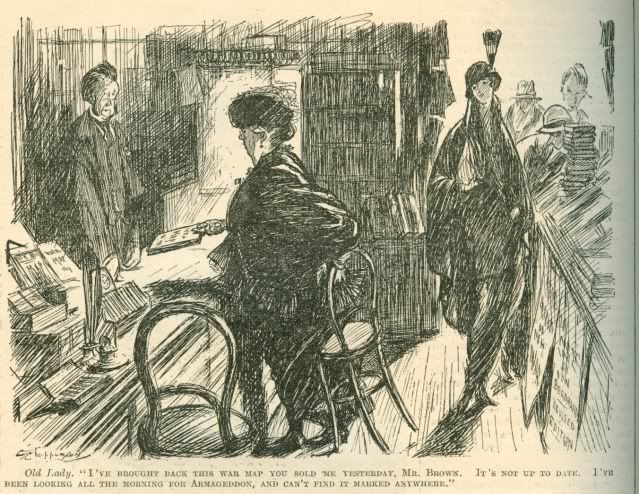
1914: Apocalypse NOT Now!
The customer wanted to make sense of what she has been reading in the press. It seems that some newspapers were indulging in purple passages when describing the war.
For this joke to work it was necessary for the readers of Punch to know (and for the elderly customer not to know) that Armageddon was, according to the Book of Revelations, the site of the final battle between Good and Evil immediately before the end of the world.
We see a splendid depiction of a bookshop over a hundred years ago. Mr Brown looks particularly unworldly. The shop reminds me of a picture I took in a serious Paris bookshop a few years ago:
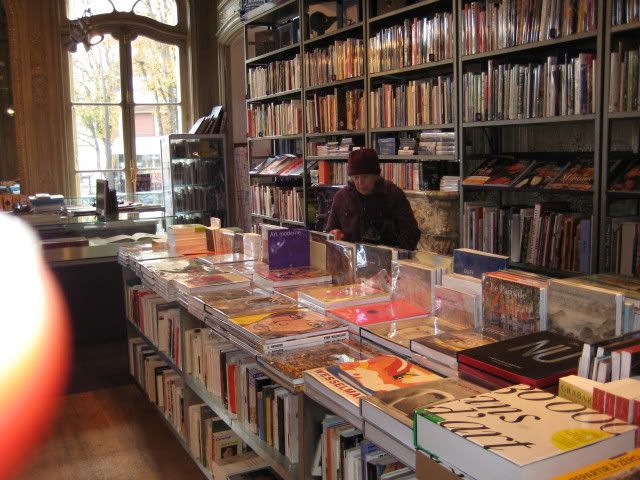
(The lady who is browsing is Mrs. M.)
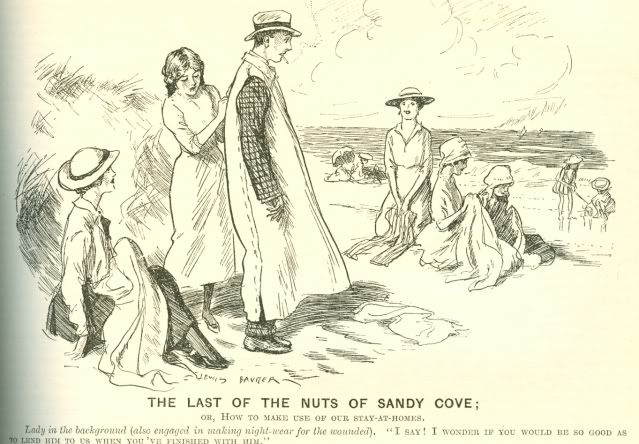
1914: Even He is Useful for Something – Though Not Much
Even on the beach the female holidaymakers are already determined to do something for the war effort. The man being used as a dummy is well aware of his lowly position in the scheme of things. At this stage he is not going to be shamed by being given a white feather by censorious women. He has probably not volunteered knowing that he would be turned down.
The women are not at this stage judging him but he looks as though he is judging himself.
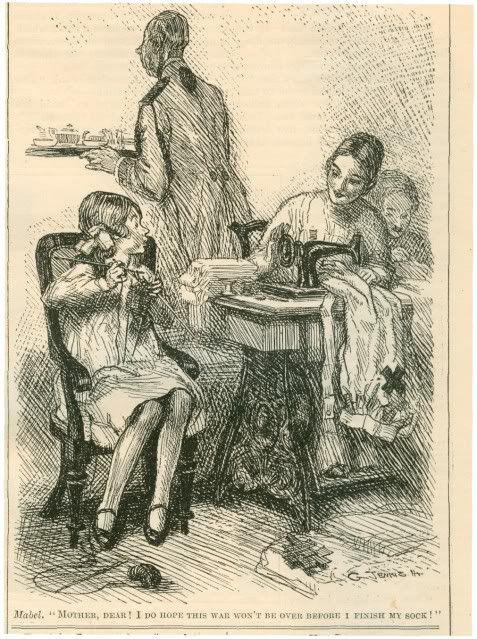
1914: A Sense of Urgency
Mabel lives in a rather grand family; we see a liveried footman carrying away a tea tray. Her mother would not normally be occupied with a sewing machine. The desire to support the soldiers has galvanised all sections of society.
Mabel was not alone in wrongly anticipating a speedy end to the war.

1914: An Ugly Story Confirmed
I have read about people throwing stones at Pomeranians (also called dachshunds) simply because they are a typically German breed of dog. I did wonder if this was really true. This cartoon clearly confirms that this did indeed happen.
With a tricolour around its neck and Union Jack attached to its extended tail this dog is further protected by the young owner.

1914: Swimming Against the Tide
Ethel is an intelligent child: she is trying to make sense of what the war means. She understands that it doesn’t just consist of soldiers marching about in splendid uniforms. She has learned that in order to win the war the soldiers must fight against the enemy soldiers and that that this involves killing them. The enemy are the Germans and the only German that she has ever met is her beloved Fräulein.
Before the war began it was quite common for upper middle class families to employ a young French or German woman of good family to act as governess for their children. This was different to the modern practice of employing au pairs since there was then no shortage of domestic servants. Germans had been quite as popular as the French before the war. A French governess would naturally be called Mam’selle and her German counterpart would obviously be called Fräulein.
What is interesting about this cartoon is that it gently suggests that not all Germans are necessarily evil monsters. This is made easier by choosing an unthreatening candidate for this treatment. Not all children became fond of their governesses but the cartoonist makes it clear that Ethel is deeply attached to Fraülein. In fact, she would have spent much more time in the company of the governess than that of her mother. So, far from relishing the thought, Ethel fears that it might be the family’s patriotic duty to kill ‘their’ German.
In fact the young woman is fortunate in being employed in a wealthy household. No doubt this would protect her from casual verbal abuse outside the house.
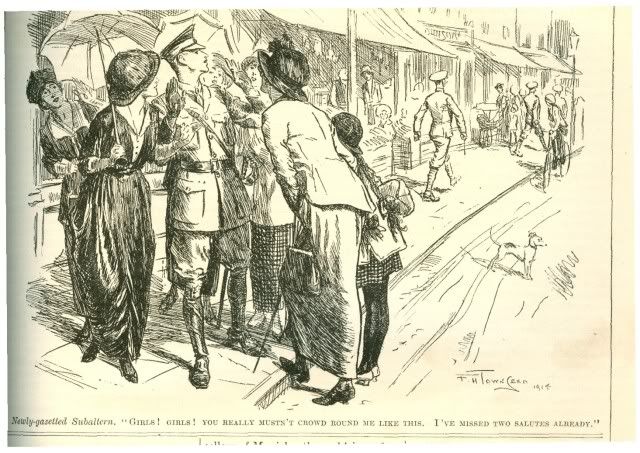
1914: The Privileges of Rank
The young lieutenant is enjoying the glamour of his new status. Not only is he besieged by females of all age groups but he is also entitled to be saluted by the other ranks.
It is just as well that he does not yet realise that in trench warfare the average life expectancy of a lieutenant was going to be a good deal shorter than that of any other rank in the British Army.
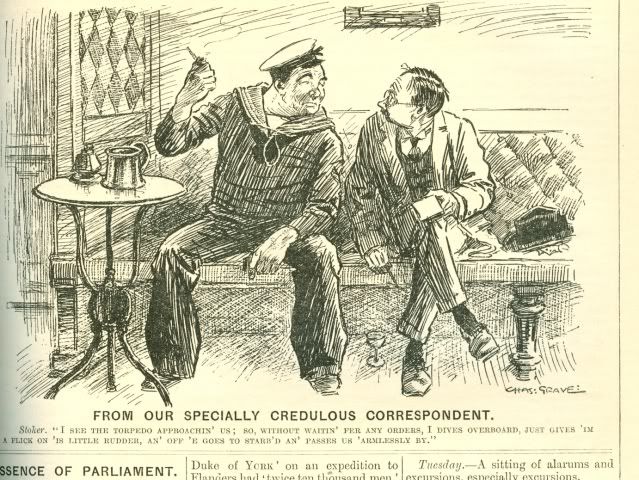
1914: Tales from the War at Sea
Readers of Punch seem to have realised that a torpedo is, in effect, an artillery shell propelled in water with the same sort of speed and force as its land based equivalent. The old salt is having a bit of fun at the expense of an ignorant journalist. I assume that his motive is to receive some more liquid refreshment.
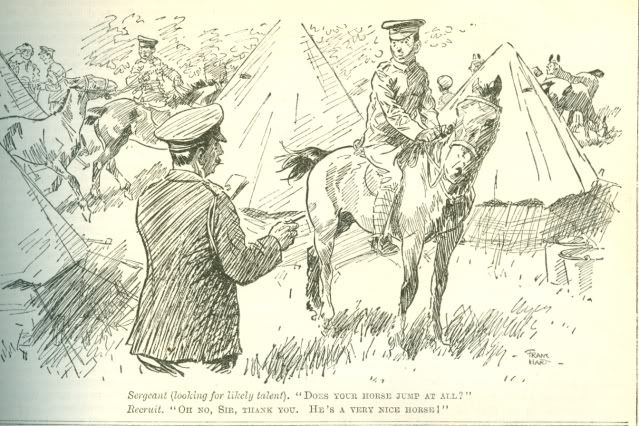
1914: Horses at War
The recruit has misunderstood the sergeant. Whereas the NCO is looking for a steed that will help to intimidate the enemy, the recruit thinks he is being asked whether it lacks the gentle spirit that he himself greatly prefers.
This cartoon reminds us of the folly of imagining that cavalry has any part to play in a war in which barbed wire, machine guns and massed artillery barrages all feature prominently. Much effort was wasted on feeding, stabling and transporting cavalry horses. Many soldiers were kept away from the fighting while waiting of the breakthrough which would permit cavalry to make substantial advances. The breakthrough never occurred and horse based warfare had become obsolete. The only military application of horses now is purely ceremonial.
On the other hand horses had an important part to play in transporting food and ammunition to the front line. For that a gentle spirit would have been entirely appropriate.
By the way, the recruit is due to get a ‘rocket’ for addressing the sergeant as ‘sir’.
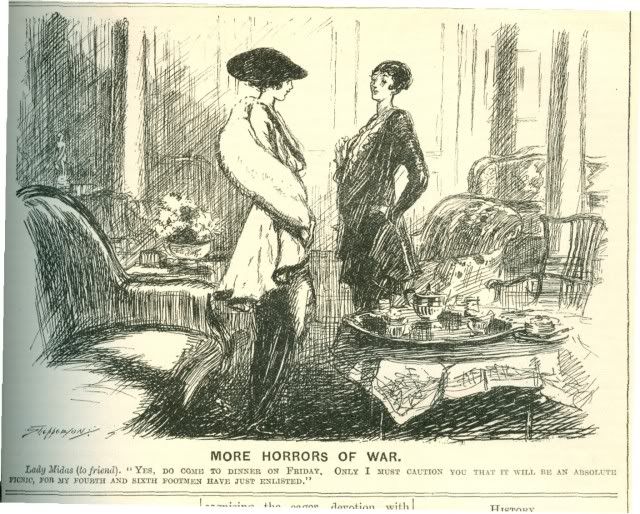
1914: We’re All in this Together According to Lady Midas
This cartoon is not praising the hostess. Having to make do without the fourth and sixth footman does not equate to a picnic. I do wonder how many people attend Lady Midas when she actually does have a picnic.
Patriotism means that she cannot complain when her servants enlist but she still feels hard done by. I had quite a few complaints about the way the makers of Downton Abbey dealt with the war but on this issue they certainly had it right. The Dowager Countess, apart from providing Maggie Smith with a truly memorable part, accurately demonstrated how many aristocrats felt about losing their servants.
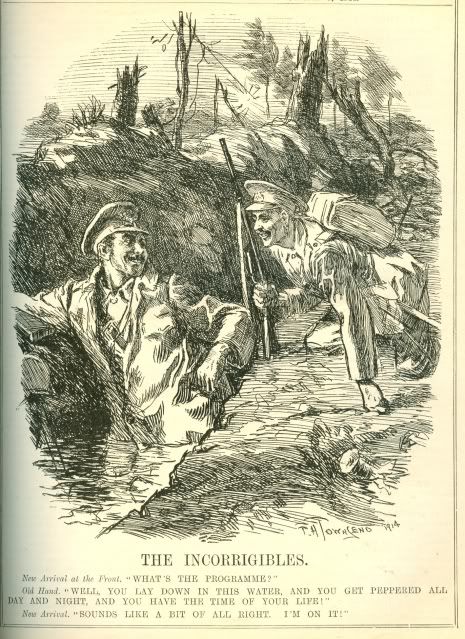
1914: Fresh Troops Arriving at the Front
Although this might look to us like wishful thinking on the part of the top brass this reflects accurately how the Tommies really felt at this early stage of the war. It was still regarded as a lark. Disillusionment was to set in later.
What is quite striking is the honesty with which conditions are being presented. Later you didn’t see the waterlogged trenches. Downton failed completely in this respect.
I’m assuming that contemporary slang is being accurately recorded. I don’t recognise it.
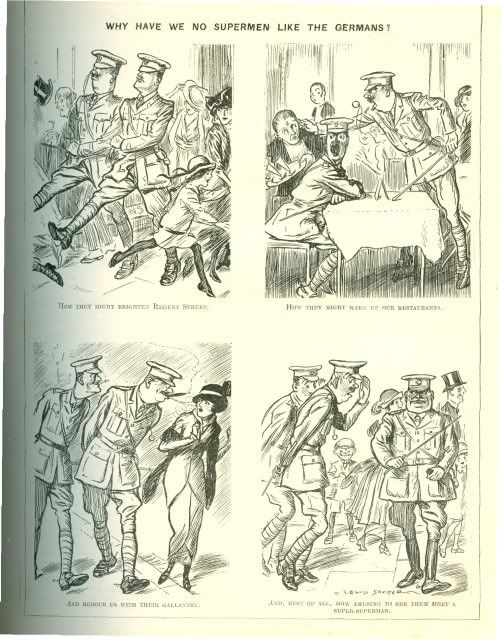
1914: What We Were Fighting Against
This is a neat piece of anti-German sentiment. Instead of portraying the jack-booted ‘horrible Hun’ throwing his weight around the artist has used British uniforms and British scenes to demonstrate the unpleasantness of this sort of behaviour.
Although I seriously doubt that all German soldiers behaved like this it is probably quite true of a substantial minority. In 1914 Germany had only been a united country for 43 years. Many differences survived and indeed plenty of them still survive today. What we are looking at (in a roundabout kind of way) is Prussian militarism.

1914: Very Acceptable – Though Not As Intended
The frequency of the appearance of knitting jokes tells us something of the desire by the women portrayed in Punch to play some sort of part in the war. It is also clear in this joke that they aren’t accustomed to this activity.
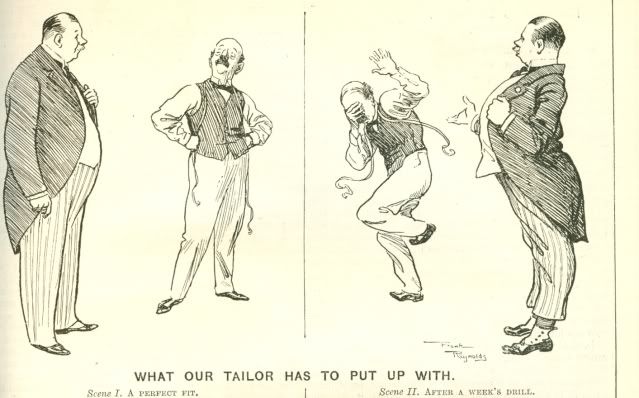
1914: Participating
This cartoon puzzled me at first. Was this overweight customer really a recruit? Surely he would have been turned down at the recruitment centre? Even if he had been accepted why then would he want a new civilian suit?
I now think that he was one of many male civilians who had participated in voluntary drill sessions. I think that the idea was the masculine equivalent to all that knitting and sewing.
Although it is somewhat different I am reminded of something that my father-in-law once told me. He had been a student at London University during that war and all the male students had been required by the college to participate in regular drill parades.
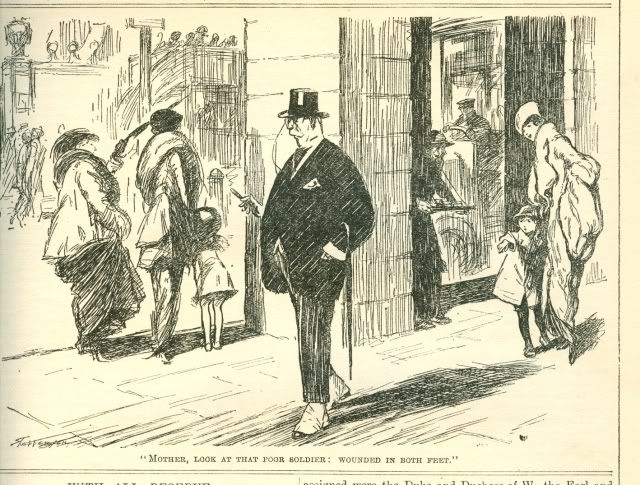
1914: Spats and the War
The child hasn’t yet learned to distinguish between soldiers and civilians and is also unfamiliar with spats. Does this suggest that the top-hatted, cigar smoking gent belongs to a far higher social category than his present onlookers? Probably not. The mother is simply amused at both the errors. The joke essentially consists of a childish mistake on both counts.
These particular spats cover more of the feet than others we have been witnessing in the pages of Punch.

1914: America and the War
The scene could be a London gentlemen’s club or an after dinner discussion before the men ‘joined the ladies’. In spite of the proclaimed egalitarianism of the United States they too had their different strata of society and this visiting American looks very much at home here. Although America is not yet considered a Great Power it is already a significant player on the international scene.
What the guest is saying is that the Americans don’t give a row of beans who defeats the Kaiser. That doesn’t really make them ‘ab-so-loootly nootral’. The readers of Punch would have liked to think that their cousins favoured the Allied cause.
Was that really true of American public opinion before the end of 1914? I rather think that depends on which Americans are expressing their opinion. This visitor looks very much like a WASP (White Anglo-Saxon Protestant). It is not surprising that he instinctively favours the British cause. Other Americans who are immigrants, or descendants of immigrants, from Germany (or Ireland?) would probably have taken the opposite point of view.
By 1917 when the unrestricted U-boat campaign was sinking American ships this neutrality came to an end. The influx of large numbers of fresh American troops in France was a major reason why the German High Command concluded late in 1918 that the war was lost.
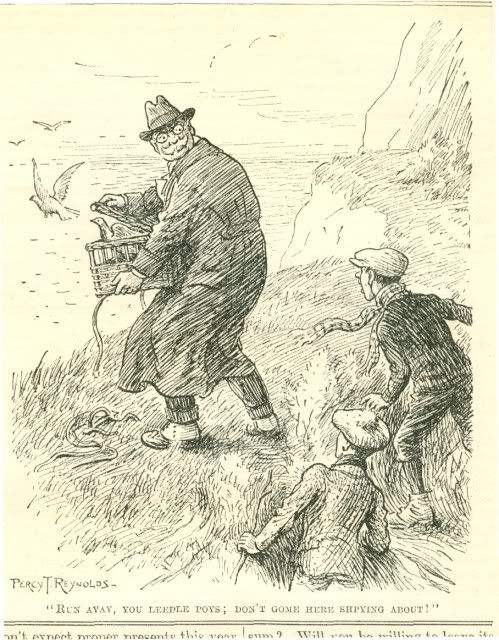
1914: Spies Everywhere!
The First World War gave rise to a regular spy mania. For instance, John Betjeman had to contend with this as a schoolboy. In spite of his British birth and upbringing he had to face the taunts of the playground:
Betjeman’s a German spy
Shoot him down and let him die:
Betjeman’s a German spy,
A German spy, A German spy
The cartoonist is typical here in imagining that a real spy would so obviously be up to no good. The brave, patriotic British youngsters have caught the villain red-handed sending messages by carrier pigeon. He releases them, not in the privacy of some garden within walls, but openly on the coast.
Naturally the spy has not even managed to learn to speak English like a native. He might as well have been carrying a placard saying ‘I am a spy. Please arrest me.’
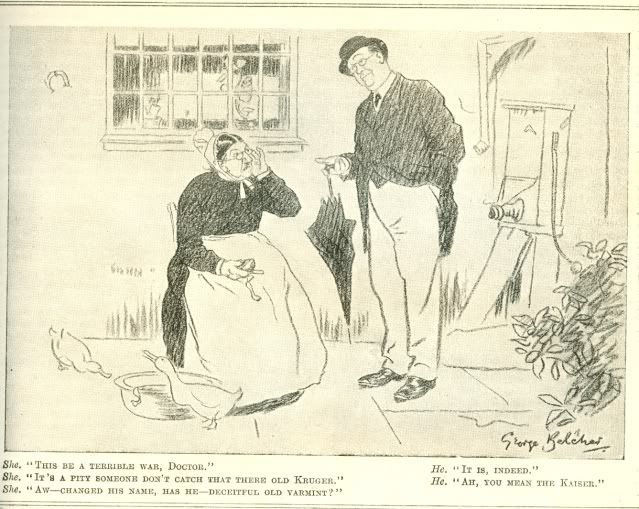
1914: Deceitful Old Varmint
George Belcher’s view of the impact of the war is as always situated well away from the upper middle class scenario of most of the Punch cartoons. The elderly patient is discussing the war with the visiting doctor. She is confusing the current conflict with the Boer War at the beginning of the Twentieth Century. As it happens the number one hate figure’s name also begins with the letter ‘K’.
She is sitting outside her house peeling apples perhaps. Her style of clothing is well behind the times. What on earth is the contraption on the right of the picture? Could it be mangle or is it something agricultural?






















